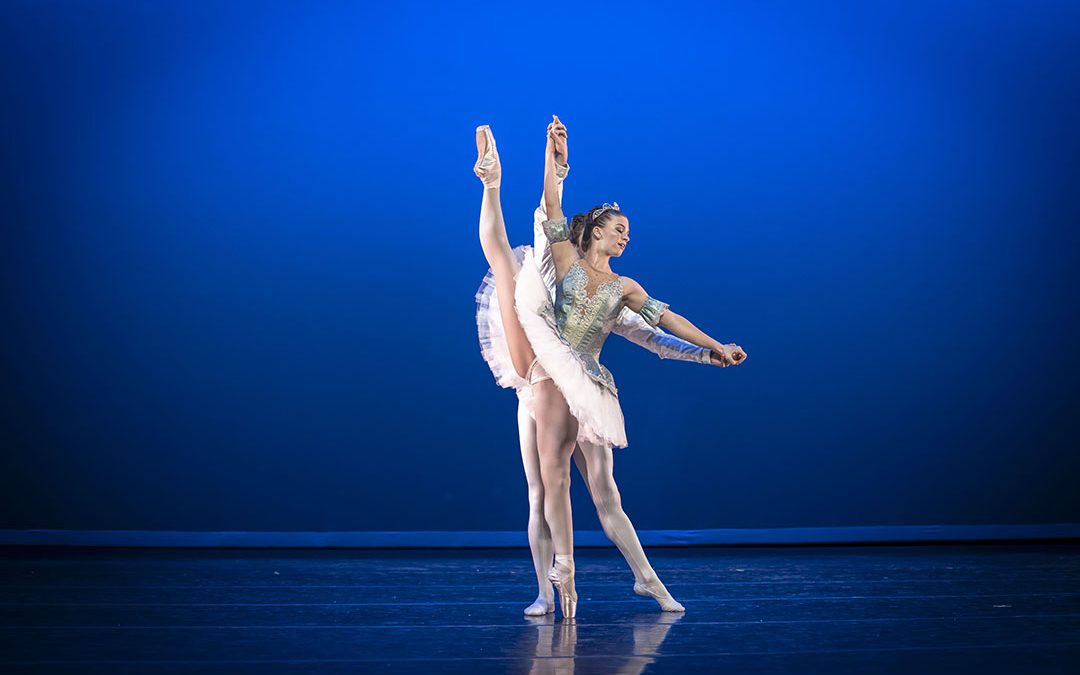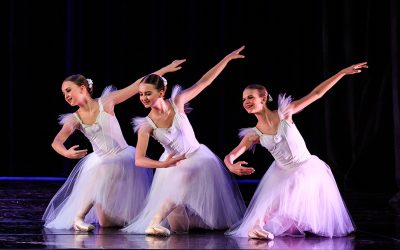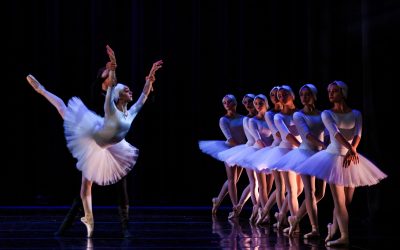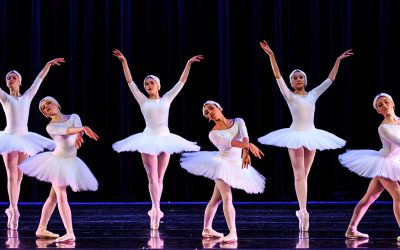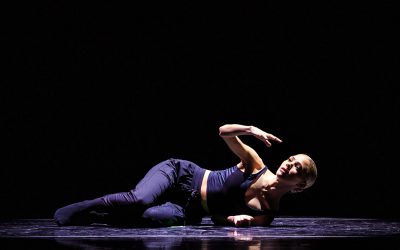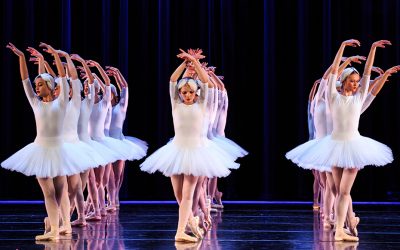A pre-professional ballet program is a ballet program that helps prepare aspiring ballerinas for semi-professional ballet opportunities. This includes auditioning for scholarships or college/university dance programs as well as professional dance companies.
A pre-professional ballet program helps dancers master and polish their ballet technique and augment their ballet skills with additional styles of dance, health and fitness, and professional skills such as writing resumes or having a successful audition.
What do Dancers Do in Pre-Professional Ballet Programs?
A pre-professional ballet program typically includes dance instruction, supplemental skills, and company dance.
Ballet Technique
For a pre-professional ballet company, ballet technique will be a large part of what you learn and master. You will most likely study classical ballet and advanced skills, including pointe, and master all the advanced techniques you will need to know for a professional or university company.
Supplemental Dance
Many pre-professional ballet programs also include supplemental dance instruction. This is important because it helps strengthen knowledge, fitness, and capabilities. It makes dancers more well-rounded. It also helps them to be able to draw from other ballet techniques that may inspire some choreographers, such as modern or flamenco.
Fitness & Health
Some pre-professional dance programs also include fitness and health instruction. This usually consists of workshops that bring in experts to talk about things like a healthy diet, conditioning, or stress management to maintain health during a ballet career.
Conditioning
In addition to dance, many pre-professional programs include conditioning classes, which focus on overall fitness. Conditioning classes include aerobic and strength workouts that help the body prepare for and withstand training and rehearsals.
Choreography
Many pre-professional ballet programs also include training in choreography. This is where dancers learn how to choreograph and stage solo and group productions. While many dancers may not go on to choreograph professional pieces, the knowledge learned during this training can help strengthen the ability to learn and understand choreography and strengthen solo pieces.
Professional Skills
In addition to training and technique, dancers also often have workshops for professional skills such as auditioning and writing a resume. They may fake headshots, polish their bios or resumes, and practice interviews to help them in their career or educational pursuits.
Company Dance
A pre-professional program is typically part of a dance company. These dancers work together through training and workshops while also applying their skills in group pieces and performances. This helps ballerinas have real-life dance company experience and performance opportunities to apply their skills and further build their resume.
Why Participate in a Pre-Professional Ballet Program?
One of the main reasons to participate in a pre-professional ballet program is to master essential technical dance skills. Professional and academic ballet programs are high competition, taking the best dancers from around the world.
A pre-professional program allows ballerinas to polish and master dance technique to increase their ability to achieve these opportunities.
These programs are specifically designed by professionals in the ballet industry who have “been there, done that.” Not only are they an excellent source of essential training for future ballet careers, but they are also a great place to network and make professional connections.
Many professional companies or university programs have connections with pre-professional ballet programs or instructors and view these programs as “incubators” for more advanced programs and companies.
In addition to essential professional connections, dancers benefit from accessing a wide variety of dance experts from a number of different companies and programs. This means insights into which program the dancer may want to pursue as well as information about what types of skills or experience that program may look for.
About Central Utah Ballet’s Pre-Professional Program
Central Utah Ballet has created a pre-professional ballet program to simulate a college and professional ballet experience. Each student will train in classical ballet technique, contemporary, modern, flamenco, character, classical ballet repertoire, learn vintage re-staged classical ballets, experience the creative process of diverse choreographers, and perform in live performances.
About the Author

Jennie Creer-King
Owner & Artistic Director
Jennie Creer-King is the owner and artistic director of Central Utah Ballet Academy. She is an award-winning dancer, instructor, and choreographer. Among her awards include “Best School Award” by the Youth American Grand Prix, “Best of State” in Choreography and Youth Performing Group, and the Presidential Scholar’s Teacher Recognition Award. Jennie has a Bachelor's Degree from the University of Utah School of Dance with an emphasis in Ballet Performance and a Master's Degree from the University of Utah School of Dance emphasis in teaching pedagogy and choreography.
You may also be interested in...
What It Takes to be a Ballet Dancer
Though professional ballerinas make the dance look effortless, there is a great deal of physical and psychological stamina behind the glamour of ballet. Not to mention the countless hours of practice to perfect form and match the gracefulness of top talent. Lastly, we...
Can You Start Ballet at 13 Years old?
As most ballerinas start their journeys young, we often get asked the question of how late is “too late” to start ballet. Our bottom line is that it is never too late to start dancing ballet. Many people start learning as adults! Though it is more difficult to dance...
Tips for Getting Better at Ballet
Do you feel you’ve plateaued in your ballet career? Or are you simply just not improving as quickly as you’d hoped? It’s important not to skip ahead to skills we’re not flexible or strong enough for. Instead, follow these proven tips to elevate your ballet career. 4...
Can You Teach Yourself Ballet?
If you are interested in learning ballet but aren’t sure you can put the time or financial investment toward classes, you may be wondering if you can teach yourself ballet. Ballet is a beautiful, fulfilling form of dance. It encompasses strength, flowing lines,...
25 Must-Know Ballet Terms
Some students are intimidated by ballet because instructors sometimes seem like they’re speaking a foreign language--because that’s just what it is! Ballet terms are French, and classical ballet instructors will use this terminology to create structure and help...
Central Utah Ballet Artistic Director, Jennie Creer-King, Unveils New Professional Ballet Company, Chrysalis Ballet
Jennie Creer-King, owner and director of Central Utah Ballet in Lehi, Utah, announces brand new professional ballet company Chrysalis Ballet with Associate Director, Garret Smith FOR IMMEDIATE RELEASE LEHI, UTAH, April 2021---Jennie Creer-King, owner and artistic...
Learn to Appreciate Ballet: 7 Steps
For those who weren’t raised in the ballet community, watching a ballet can seem foreign—and maybe even boring. Ballet is a nuanced art that can make it more difficult to appreciate for some casual observers. However, with the right approach and mindset, anyone can...
How to Make the Most of Summer Ballet Intensives
If you’re like most ballet dancers, summer means one thing: summer intensives. Summer intensives are an age-old tradition where dancers get together for several weeks of rigorous training and exceptional practice during the summer months when other distractions like...
Central Utah Ballet Announces Their Summer Programs for 2021
Central Utah Ballet, a new ballet school in Lehi, Utah, with owner and artistic director Jennie Creer-King, has announced summer intensive programs and camps to help aspiring dancers further their classical ballet skills and training. FOR IMMEDIATE RELEASE LEHI, UTAH,...

